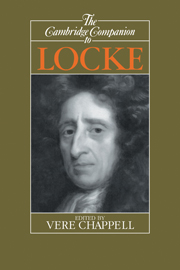Book contents
- Frontmatter
- Introduction
- 1 Locke's life and times
- 2 Locke's theory of ideas
- 3 Locke's philosophy of body
- 4 Locke's philosophy of mind
- 5 Locke's philosophy of language
- 6 Locke's theory of knowledge
- 7 Locke's philosophy of religion
- 8 Locke's moral philosophy
- 9 Locke's political philosophy
- 10 Locke's influence
- Bibliography
- Index
6 - Locke's theory of knowledge
Published online by Cambridge University Press: 28 May 2006
- Frontmatter
- Introduction
- 1 Locke's life and times
- 2 Locke's theory of ideas
- 3 Locke's philosophy of body
- 4 Locke's philosophy of mind
- 5 Locke's philosophy of language
- 6 Locke's theory of knowledge
- 7 Locke's philosophy of religion
- 8 Locke's moral philosophy
- 9 Locke's political philosophy
- 10 Locke's influence
- Bibliography
- Index
Summary
In the course of its considerable length the Essay concerning Human Understanding deals with many topics; but its main theme and concern is knowledge and the capacity of the human understanding to acquire it. “[M]y Purpose” Locke tells us, is “to enquire into the Original, Certainty, and Extent of humane Knowledge; together, with the Grounds and Degrees of Belief, Opinion, and Assent” (E I.i.2: 43). What is knowledge and how is it acquired? Are there any limits to what we can know and, therefore, things about which we can have only beliefs and things about which we must be ignorant? What, indeed, is the difference between knowledge and belief? As its title indicates, the Essay intends these as questions more about the human knower and believer rather than about what is known and believed. What can we, with our minds, know? In setting out to inquire into knowledge Locke is setting out “to take a Survey of our own Understandings, examine our own Powers, and see to what Things they were adapted” (E I.i.7: 47).
In the background to his questions was a contemporary debate that arose from a large number of arguments against the very possibility of knowledge, arguments that were found in an account of early Greek skepticism, Outlines of Pyrrhonism, written by Sextus Empiricus (fl. A.D. 200). Pointing out that people disagree, these arguments challenge anyone who thinks the truth can be found to say who is its proper judge or real discoverer. Pointing out that our senses are unreliable and our reasonings often mistaken, they ask by what means truth is to be discovered.
- Type
- Chapter
- Information
- The Cambridge Companion to Locke , pp. 146 - 171Publisher: Cambridge University PressPrint publication year: 1994
- 13
- Cited by



